hen looking for an enterprise LMS or simply a solid solution for large organizations, Docebo and Absorb LMS are surely among the leading options. Why? They both have comprehensive features, powerful intelligence tools, and decent content provision options.
Whether you are researching what is the best fit, or just considering Docebo or Absorb as ealternatives, a decent analysis will help you a lot.
Read on to compare Docebo vs Absorb LMS in our review, and see which tools will suit you.
Docebo Overview

Docebo Pros and Cons
Absorb LMS Overview

#1. Absorb vs Docebo Course Creation and Management
To create a course with Docebo, organizations and enterprises may use basic features as well as advanced features.
First of all, the creation starts within a separate section, “Course Creation”. You won’t manage courses unless you are in this section.
There, you can create two types of courses: e-learning courses and instructor-led session courses.
Notably, you may create folders to categorize courses, as you will see all of them in the form of a list. Which is not quite intuitive and easy to follow. Yet, it adds to the general structure.
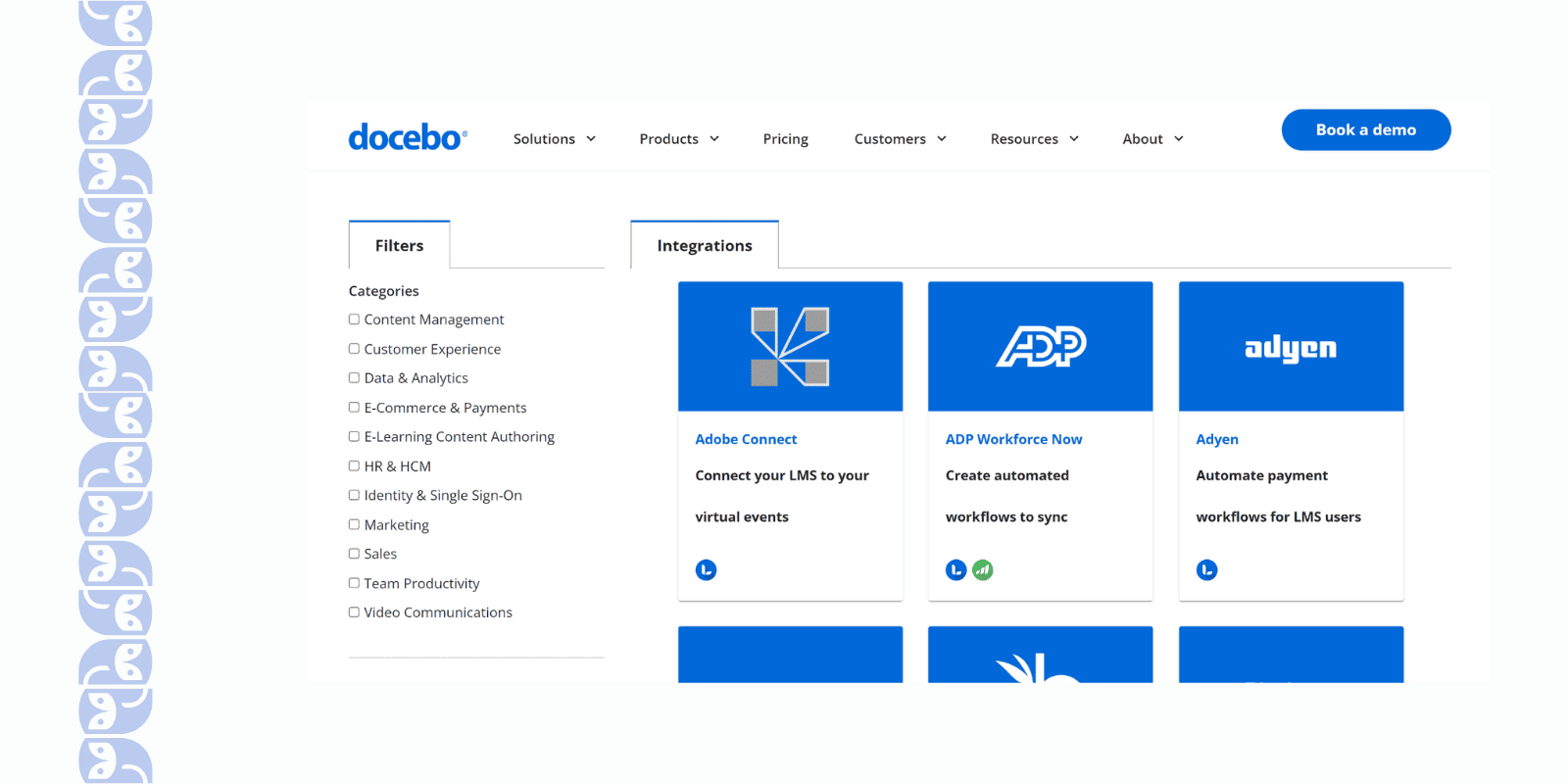
From the main page, you can assign and unassign courses to specific channels, learning plans, or catalogs. Other than that, there are duplication features for courses and widgets, automated enrollment, the ability to hide and unhide content, notifications, and auto-tagging.
The distinctive features refer to:
- Powerful AI-powered tools. In particular, Docebo Skills provides intelligent course recommendations and skill tagging for personalized learning paths. AI tool supports a quiz maker and allows administrators to create interactive assessments.
- Large content marketplace. Docebo offers a rich library of pre-made courses, training materials, and audio lessons, which is a great way for enterprises to support scaling.
Absorb LMS seems to offer a more intuitive and direct approach for instructors.
How? Administrators can organize content into chapters and lessons with ease, leveraging tools like learning objects to integrate videos, assessments, or third-party content.
Yet, before adding a course, you will create a page and syllabus and then switch to lessons. It is more intuitive than Docebo, but there may be too many steps for a smooth experience.
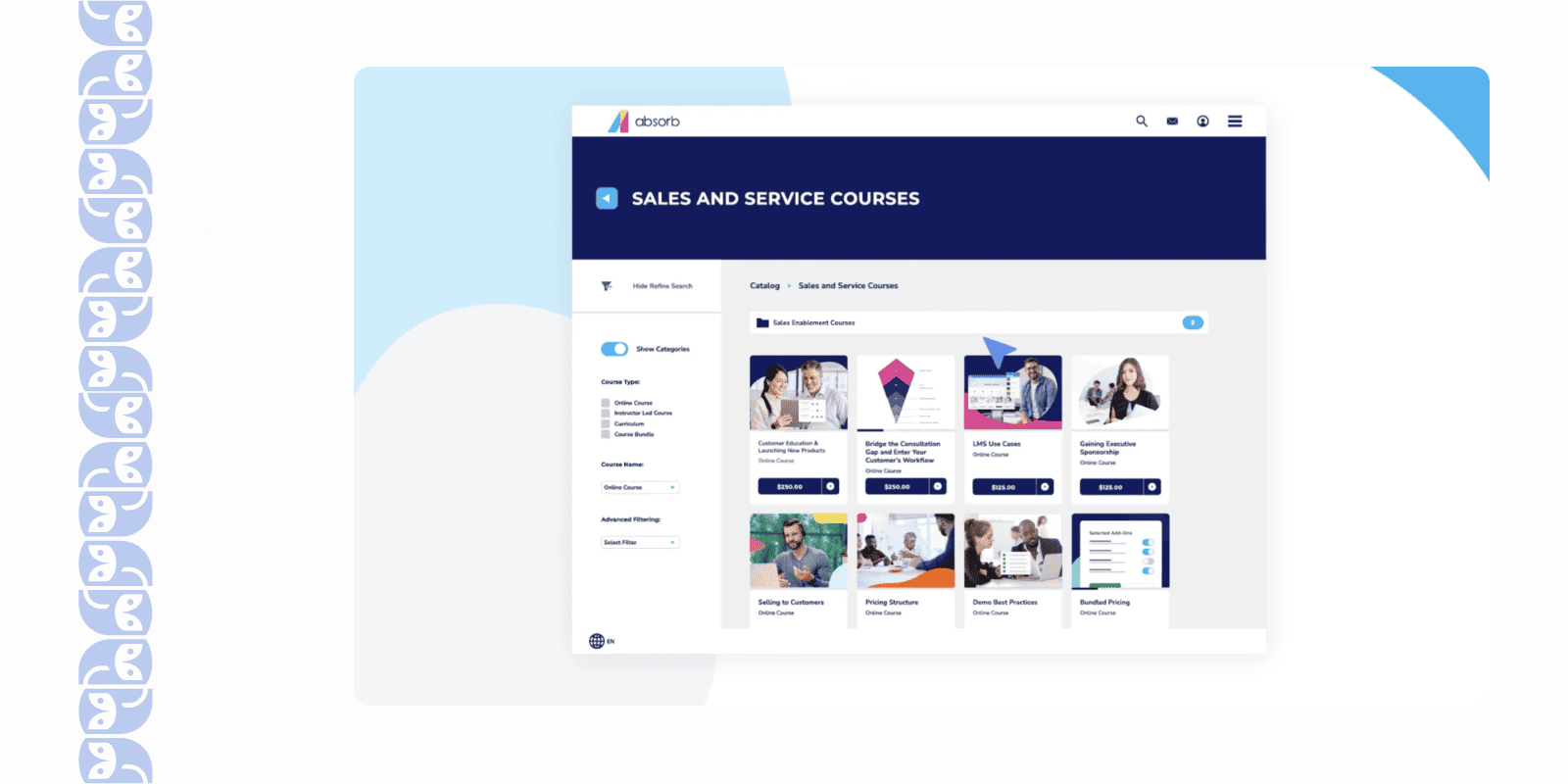
Also, you can set self-enrollment rules and manage course visibility. Other than that, there is better learning path customization thanks to tags, additional languages, and portal creation.
The great features are:
- Portals. Absorb LMS provides different ways to customize learning portals and create spaces for different teams.
- Proctor Course. A code option to add more security to course administration, allowing you to manage access.
- Absorb Create. Similar to Docebo, Absorb LMS provides powerful AI tools to create materials and simplify the generation of content.
Highlight: Absorb LMS is more intuitive with greater customization and control, while Docebo offers more in terms of automation and AI support. Yet, both platforms are quite heavy and difficult to operate.
#2. Content Creation: More Variety from Absorb?
Comparing Docebo vs Absorb LMS, both LMSs have similar functionality.
Docebo works greatly with SCORM files and provides an opportunity to add content to the courses as course widgets.
There, you have quite a number of content types. They refer to SCORM, AICC, and xAPI files, video materials, observation checklists, and interactive HTML pages. It also integrates with tools like Elucidat and enables the creation of custom tests, surveys, and presentations using its Slide Converter.
Advantages: a large content marketplace backed by 150+ top publishers and AI authoring.
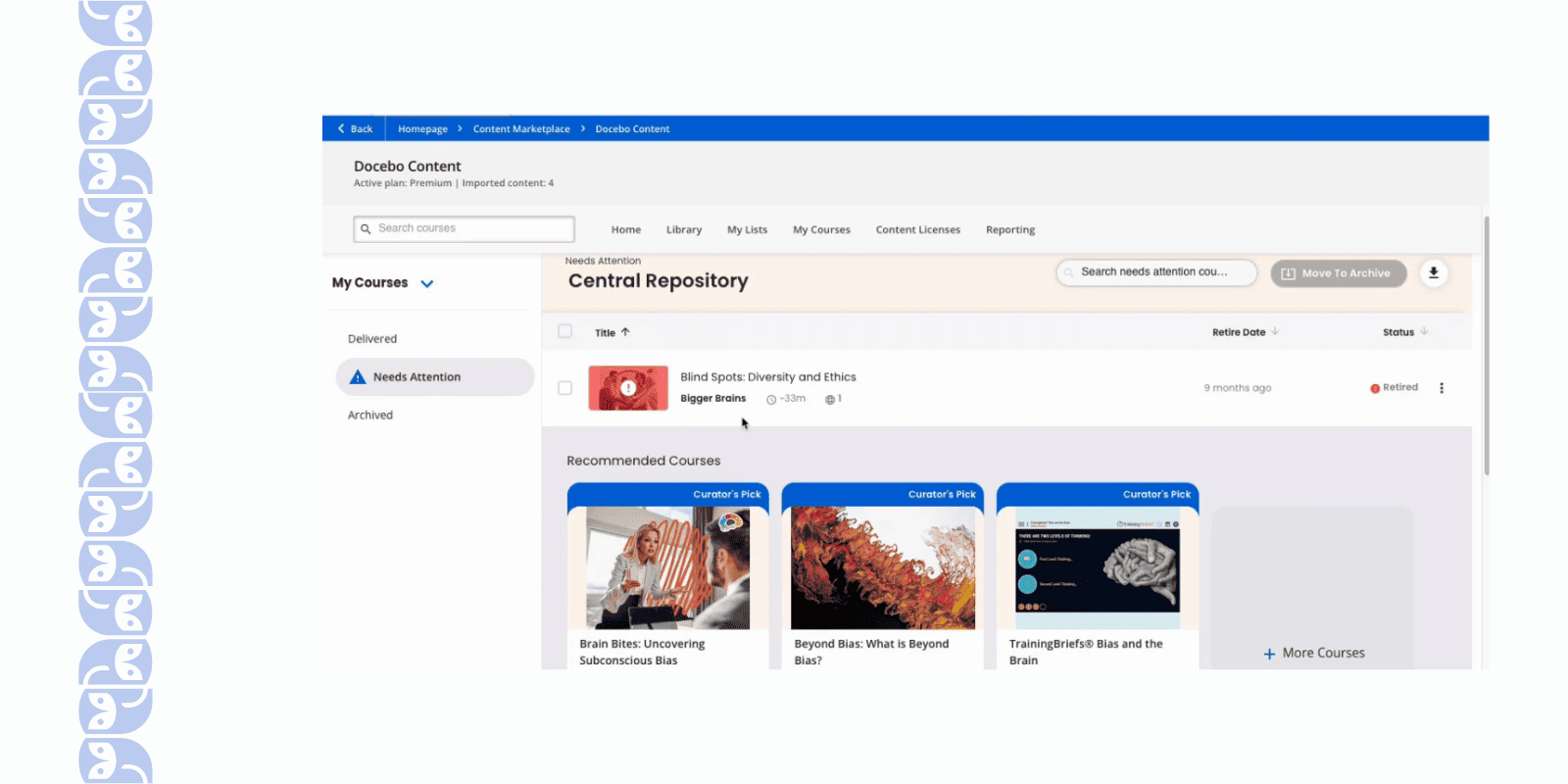
In comparison, Absorb LMS is not far behind, bringing similar types via Learning Objects that can be added to courses.
In particular, Absorb LMS supports SCORM, AICC, and Tin Can formats, brings in videos with subtitles and PDFs, and allows adding external links. Also, it offers observation checklists and tasks, e-signatures, and third-party content.

Advantages: it provides e-signatures asked for by some niches and provides LinkedIn learning integrations.
Highlight: Absorb seems to bring a better user experience and diversity of content options, while Docebo offers an effective content marketplace and focuses on SCORM files.
#3. Quizzes and Assignments: More From Docebo?
Now, let’s consider which learning management system is better for assessing learners, Docebo or Absorb LMS.
Docebo has comprehensive tools for evaluating learners, including assignments and tests with different question types.
- Via assignments, learners can submit diverse file types, screencasts, or external links, which instructors can evaluate and provide feedback on.
- Tests feature diverse question formats, including multiple-choice, fill-in-the-blank, and file uploads.
Besides, Docebo offers scoring options, feedback, and advanced settings like question difficulty or time limits to control assessment. For instance, admins can define whether learners need to wait for grading to proceed or can continue upon submission.
Absorb LMS allows solid flexibility in terms of tasks, survey, and assessment settings.
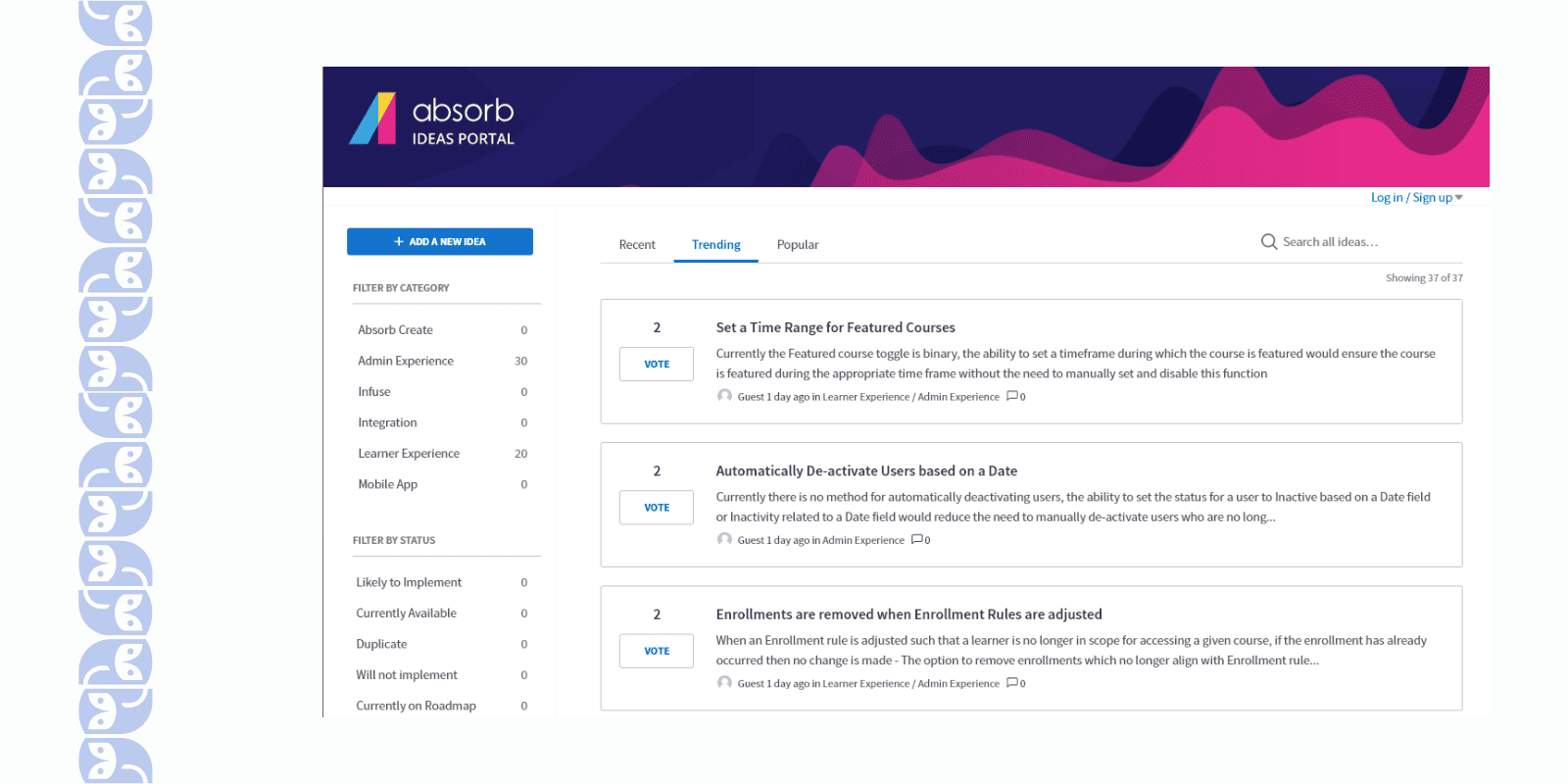
You can set whether you want them with feedback, timed, messages, scored, etc. So, the customization is on point there. In particular, there are the following types:
- Tasks, reviewed by administrators, allow scoring with customizable weights and pass settings.
- Assessments offer diverse settings, including weighted grading, question banks, multiple attempts, and randomized questions or answers.
- Surveys constitute another option and have similar settings as tasks and assessments.
Highlight: Absorb LMS seems to have more settings, while Docebo seems to offer a more direct approach to quiz-making due to diverse question types.
#4. Engagement Tools: Collaboration or Gamified Experience?
Docebo provides basic tools for collaboration that are available via widgets, and brings solid tools for gamification via the gamification app. Here are the main options:
- The gamification suite includes leaderboards, a rewards shop, contests, and customizable badges that encourage healthy competition and track learner achievements.
- Forums, channels, and comments are widgets that learners and instructors can use to discuss and share insights.
- Community hub is another option, enabling members to post messages, ask questions, and interact via gamification.
Absorb LMS provides a separate module to allow you to enhance collaboration and gamification. Thus, it may require additional costs.
Nevertheless, it provides interactive and engaging features to motivate learners and employees:
- Billboards, or custom pages with data, images, and videos, promote informal learning.
- Classic leaderboards, badges, and even public profiles for greater motivation.
- Forums and polls for discussion, insights, and feedback.
- Newsfeed is like an activity stream demonstrating the latest courses and actions, training news, or corporate events.
Highlight: Docebo LMS brings in powerful gamification options that are pretty diverse and have distinct features like rewards shops and contests, and Absorb brings more interactive options for real-time communication.
#5. Absorb vs Docebo Reporting: Does Docebo provide better analytics?
Docebo is known for its data analytics capabilities and numerous ways to handle reporting effectively. Yet, it’s not always easy, as with advanced features comes a level of complexity.
Why does Docebo excel, then?
- It provides customizable dashboards, AI recommendations, advanced filters, and integrations with key BI tools.
- Docebo offers the analysis of key metrics like enrollment, course completion, time spent, and test or assignment scores.
- With it, administrators can create standard reports and custom reports, with specific metrics, linking training data to retention, productivity, and revenue impact.
- It offers an advanced mode with the AWS Quicksight solution to track specific data by properties.
- This enterprise LMS connects with Salesforce and Workday, as well as other systems, to help align learning programs with business outcomes efficiently.
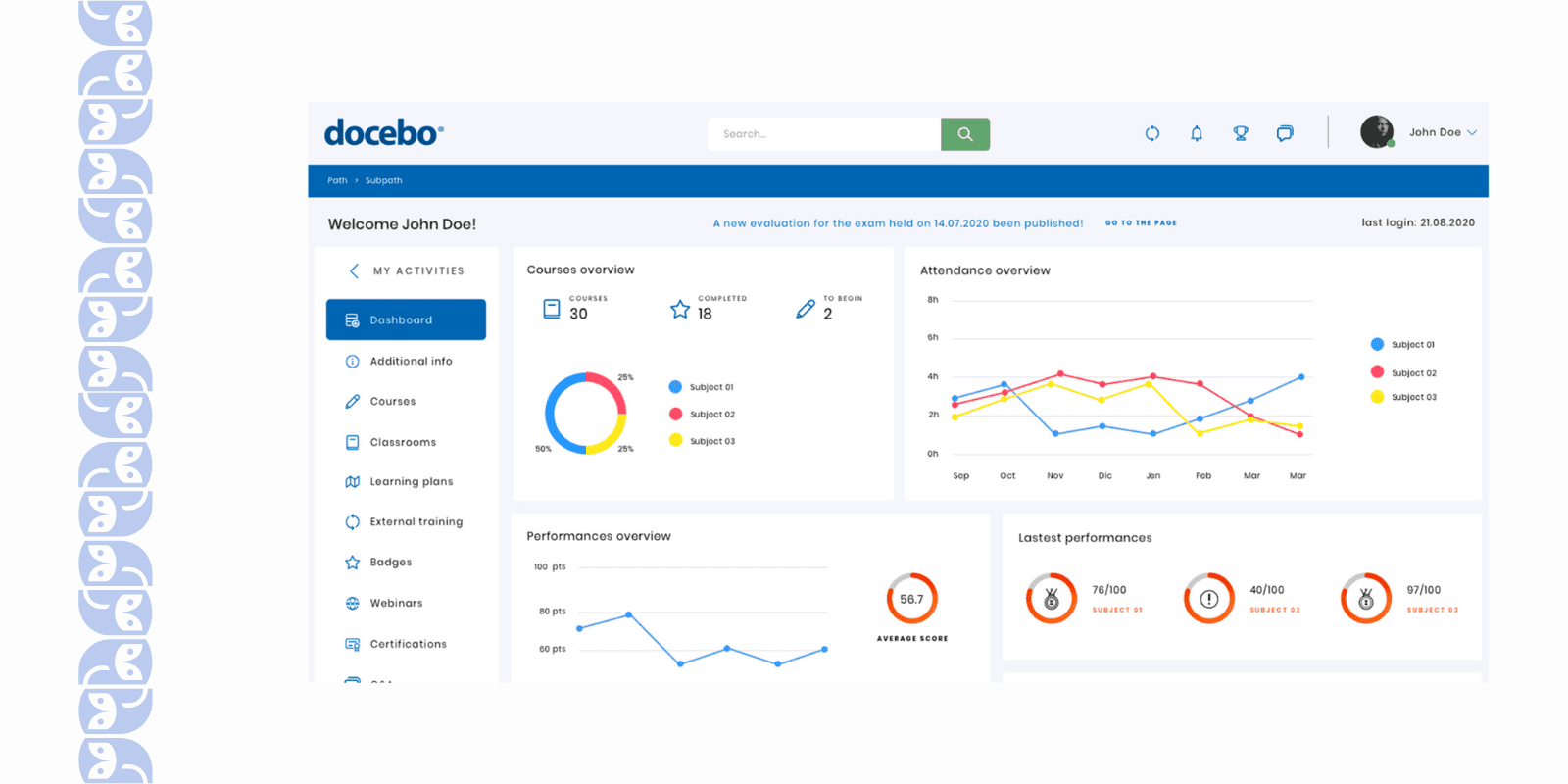
Absorb LMS seems to have a simpler approach to analytics, offering fewer reporting capabilities, yet bringing in great customizable dashboards and templates.
First of all, administrators can track learner progress, course completion, and certifications while also identifying content gaps using tools like Search Analytics.
Secondly, the system supports custom data fields, dynamic filters, and preset layouts, enabling quick access to tailored insights.
Absorb Analyze. At the same time, if you want to have reporting features analytics, you will need to have a separate module — Absorb Analyze. With it, you will be able to get deeper data visualizations, integrations with BI tools, and additional opportunities.
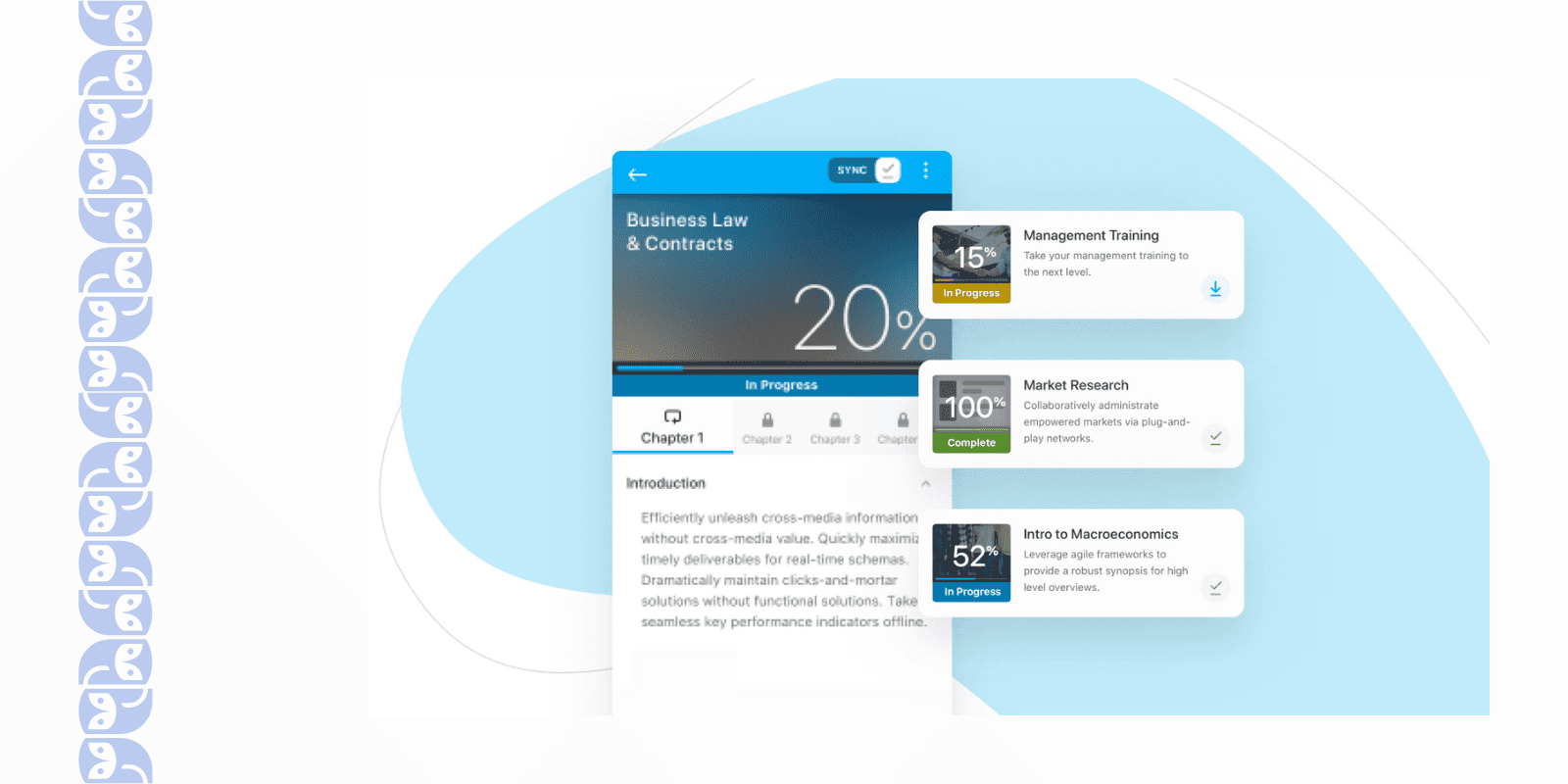
Note. Users underline that reporting is pretty basic and often does not meet the organizational needs of the companies unless you buy Absorb Analyze. For instance, they won’t pull reports for multiple courses or will lack important metrics.
Highlight: Compared to Absorb LMS, Docebo seems to offer more advanced options for reporting, yet, despite issues, Absorb LMS provides great dashboards and custom reports.
#6. Absorb LMS vs Docebo Integrations
Both learning management systems provide great integrations with the software and tools that business organizations often use. Docebo seems to have more connections with various tools, while Absorb focuses on the CRMs and systems related to HR.
Let’s see the list of key integrations:
Docebo's featured connections are: Honorlock, Microsoft Teams, Salesforce, Udemy, Workday, and Slack.
Other than that, it connects with HiBob, BambooHR, ADP Workforce Now, Elucidat, Oracle, SurveyMonkey, Eventbrite, Zendesk, Marketo, Hubspot, and many more.
Docebo can connect with different tools, referring to Content Management, Data & Analytics, E-Commerce & Payments, E-Learning Content Authoring, HR & HCM, Marketing, Proctoring, Sales, Video Communications, Virtual Labs, and Web Services.
What about Absorb LMS?
Absorb LMS integrations can fall into 4 categories: HCMs & HRIS, CRMs. Content, and More. The key integrations refer to ADP, Workday, SapSuccess Factors, Namely, BambooHR, Ceridian, Zoom, Salesforce, HubSpot, Linkedin Learning, Salesforce, Oracle, and Google Workspace.
Notably, both LMSs connect with BI tools and offer iframe and API solutions.
Highlight: Docebo seems to offer more integrations; however, Absorb LMS is not far behind, being pretty customizable due to API options.
#7. Docebo vs Absorb LMS Pricing
Both products have a non-transparent pricing policy, contemplating knowing the price upon request or organizing the demo. Yet, despite both products being pretty expensive, Docebo seems to be more expensive than Absorb LMS.
Docebo pricing starts at $16,000 annually (for 200 users), requiring an annual commitment.
With plans like Engage, Elevate, and Enterprise, costs vary based on features such as advanced analytics, integrations, and branded apps. Docebo underlines that its team considers yearly active users (YAU) and product tiers to offer high flexibility.
Nevertheless, such an approach may not be used for enterprises with fluctuating numbers of users or courses and medium organizations wanting to save resources.
Absorb LMS pricing is also available upon request, where the company will offer a personalized offer based on the number of students you have.
It means it implements a pay-per-user model. In particular, for 500 learners, the annual subscription is likely to be around $14,500.
Thus, it may be a better option for organizations with stable learner counts. Just like with Docebo, businesses with fluctuating user numbers may find this model less efficient.
Highlight: Both LMSs are pretty expensive, requiring an annual commitment and having non-public pricing.
Note. If you are looking for a more affordable solution with no additional costs that is flexible and more intuitive, consider EducateMe.
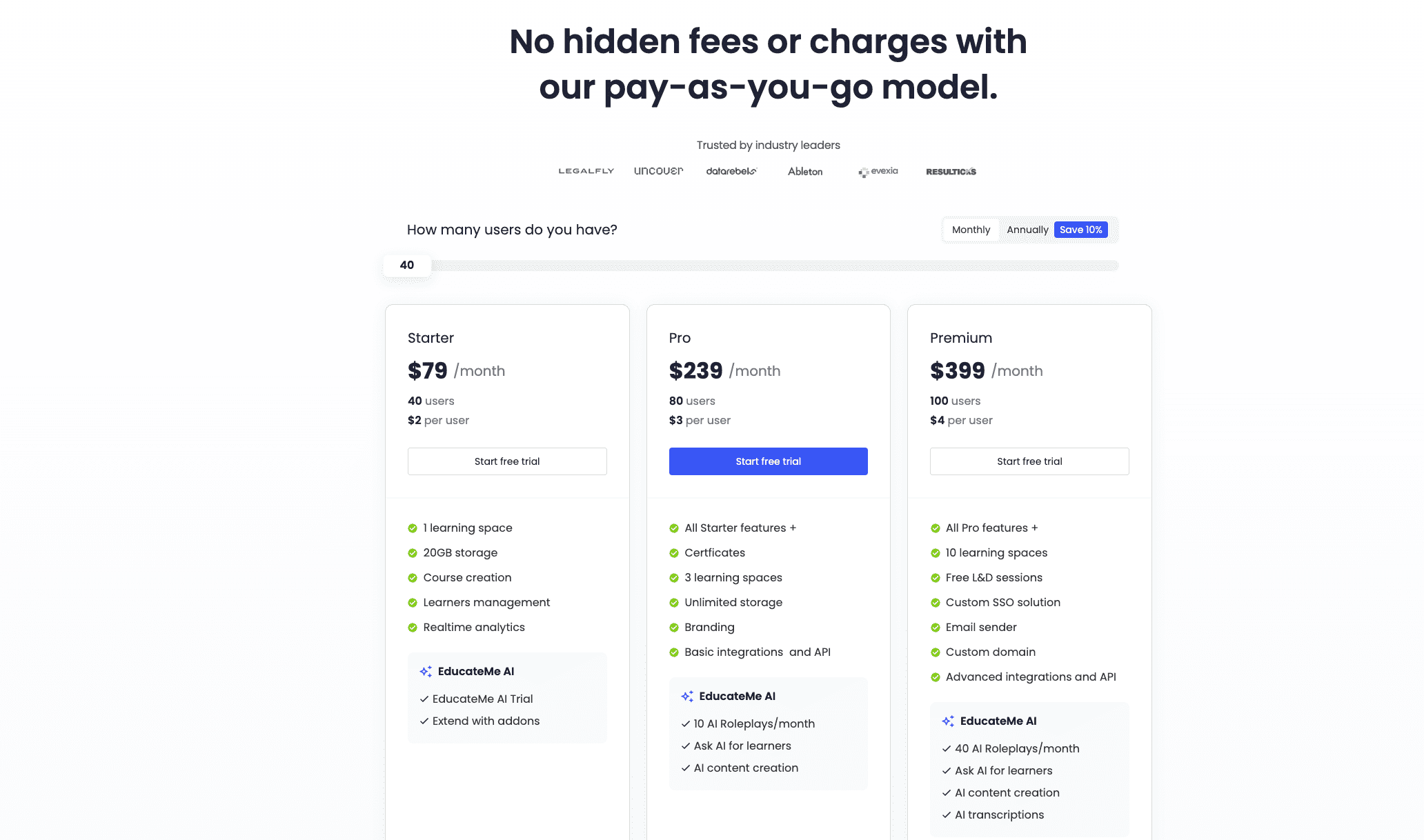
EducateMe as an Alternative LMS for Enterprises
If you’re looking for an enterprise-ready LMS that combines intuitive design, affordability, and scalability, EducateMe is a strong alternative to both Docebo and Absorb LMS. While Docebo focuses on automation and Absorb on customization, EducateMe stands out with its balance of usability, flexibility, and modern collaboration tools that suit large organizations and growing teams alike.
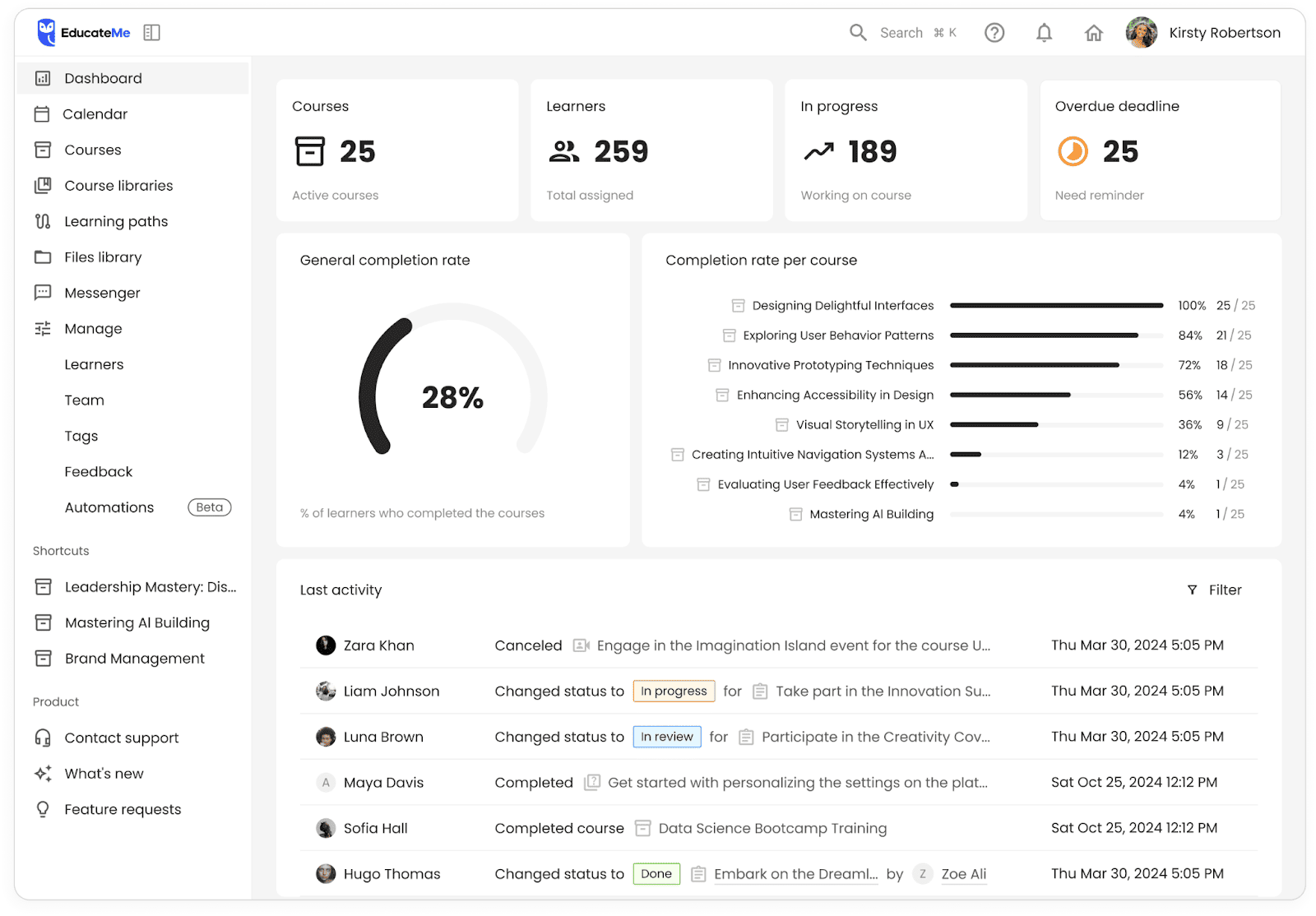
Here’s why EducateMe is worth considering:
- All-in-One Learning Ecosystem – EducateMe integrates course creation, community spaces, assignments, analytics, and coaching tools in one centralized platform, eliminating the need for multiple add-ons or third-party apps.
- Modern, Intuitive UI – Compared to Docebo and Absorb, EducateMe offers a clean, user-friendly interface that simplifies administration and enhances the learner experience.
- Flexible Course Creation – Easily create self-paced, blended, or instructor-led courses. Build structured learning paths, manage cohorts, and automate enrollment with minimal setup.
- Collaboration and Engagement – EducateMe focuses on social learning, with discussion spaces, peer feedback, and group activities that foster engagement and community-driven learning.
- Advanced Integrations – It connects seamlessly with tools like Zoom, Google Workspace, Slack, HubSpot, and others, ensuring smooth workflow integration for corporate learning environments.
- Scalable and Cost-Effective – Transparent pricing and flexible subscription model make it ideal for enterprises, training providers, and organizations that need scalability without hidden costs or rigid user limits.
- Powerful Analytics – Get actionable insights into learner progress, engagement, and performance without the need for extra analytics modules.
Highlight: EducateMe combines the automation and analytics strengths of Docebo with the usability and flexibility of Absorb LMS, while remaining more affordable and easier to manage for large organizations and corporate training teams.
Verdict on Absorb vs Docebo: Which LMS is better?
Frankly, it’s hard to tell. Both Docebo and Absorb LMS are strong enterprise learning solutions with distinct advantages.
- Docebo excels in automation, AI-powered tools, gamification, and advanced analytics. However, its unintuitive interface, high pricing, and additional costs for features can be a challenge.
- Absorb LMS offers a more user-friendly interface, better customization options, and solid content management and collaboration. While its reporting is simpler, the optional Absorb Analyze add-on enhances analytics. It is slightly more affordable but still expensive.
Verdict: Choose Docebo for AI-driven learning and analytics; opt for Absorb LMS for ease of use and customization.
Yet, if you seek a more affordable, flexible alternative with intuitive course creation and powerful integrations, try EducateMe.























